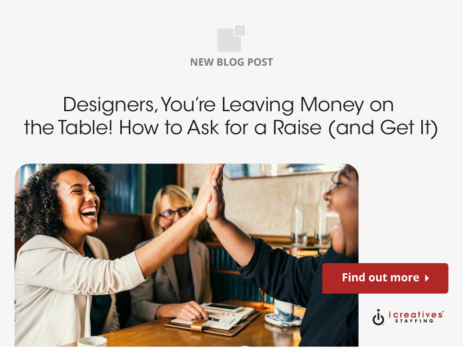Designers, You’re Leaving Money on the Table! How to Ask for a Raise (and Get It)
Many designers, whether they are in graphic design, UX/UI, or another creative field, often struggle with the conversation about raising their compensation. It’s a pivotal moment that can significantly impact your career trajectory and financial stability. Understanding how to approach this conversation with confidence and strategic insight is crucial.
Asking for a raise is not just about stating your desire for more money; it involves preparing a compelling case that highlights your value to the company. This preparation includes gathering evidence of your accomplishments, understanding the market rate for your position, and aligning your request with the company’s goals and financial situation.
The timing of your request also plays a critical role. It’s important to choose a moment when the company is financially stable and when you have recently demonstrated your value through a successful project or positive performance review. This strategic timing can significantly increase your chances of success.
This guide will walk you through the necessary steps and considerations to effectively ask for a raise as a designer, ensuring you are well-prepared to initiate this important discussion.
By the end of this article, you will have a clearer understanding of how to present your case for a raise in a manner that is persuasive and reflective of your worth as a designer.
Most Asked Questions About Asking for a Raise as a Designer
- When is the right time to ask for a raise?
- How should I prepare to ask for a raise?
- What key points should I highlight during the raise discussion?
- How can I negotiate if my raise request is denied?
- Are there alternatives to a financial raise?

When is the right time to ask for a raise?
Timing is crucial when it comes to asking for a raise. Ideally, you should approach this conversation after achieving a significant accomplishment or at the end of a successful project. This positions you as a valuable asset to the company, making it easier to justify your request for higher compensation.
Another strategic time is during your annual performance review, when your contributions over the past year are already being evaluated. This is when management is most likely to consider adjustments to compensation.
It’s also important to consider the company’s financial health. Requesting a raise during a period of financial stability or growth increases the likelihood of approval. Conversely, asking during a downturn, when budget cuts are prevalent, might not only reduce your chances but could also reflect poorly on your understanding of the company’s conditions.
Understanding the industry standard for salaries in your field can also guide the timing of your request. If you are being paid below market rate, you can leverage this information during your negotiation.
Lastly, consider your personal growth within the company. If you’ve taken on more responsibilities or expanded your skill set significantly, it might be time to ask for a raise that reflects your new role within the organization.
How should I prepare to ask for a raise?
Preparation is key to successfully asking for a raise. Start by documenting your achievements, particularly those that have directly contributed to the company’s bottom line or enhanced its reputation. Prepare a list of your completed projects, client testimonials, and any awards or recognitions you have received.
Research the current market rates for your position in your geographic area and industry. Websites like Glassdoor and Payscale can provide insights into what designers with your experience and skills are earning.
It’s also beneficial to understand your company’s salary policies and timelines. Some companies have set periods during the year when they review salaries, and you’ll want to align your request with these times.
Practice your pitch. Be ready to clearly articulate why you deserve a raise, referencing your documented achievements and market research. Confidence and clarity in your presentation can make a significant difference in how your request is received.
Finally, prepare for any counterarguments or questions that might arise. Being able to address these effectively can strengthen your case and show your preparedness and professionalism.

What key points should I highlight during the raise discussion?
During the raise discussion, focus on your contributions to the company. Highlight specific projects where you added value, especially those that had a measurable impact on the company’s success. Be specific about your role in these achievements and the skills you used to accomplish them.
Discuss your professional growth and any new responsibilities you have taken on. Show how your role has evolved since your last salary adjustment.
It’s also helpful to mention market standards and how your current compensation compares. If you are being paid less than the average for similar roles in your area, present this data tactfully as part of your argument for a raise.
Express your commitment to the company’s future. Employers are more likely to invest in employees who are invested in them. Talk about your future goals within the company and how you see yourself contributing to its long-term success.
Keep the tone positive and professional. This conversation is not just about asking for more money but about recognizing your value and contributions to the company.
How can I negotiate if my raise request is denied?
If your initial request for a raise is denied, it’s important to remain calm and professional. Ask for feedback and the reasons behind the decision. Understanding these can help you address any areas of concern and strategize your next steps.
Inquire about the possibility of revisiting your salary at a later date. Sometimes, budget constraints are temporary, and companies may be open to increasing compensation once financial conditions improve.
Consider negotiating for non-monetary benefits such as additional vacation time, flexible working conditions, or professional development opportunities. These can also significantly improve your overall job satisfaction and career progression.
Express your continued enthusiasm for your role and the company. Let your employer know that you are eager to contribute and look forward to opportunities for growth and reevaluation.
Keep the door open for future discussions. A “no” now is not necessarily a “no” forever. Maintaining a positive and proactive attitude can leave a good impression and may influence future considerations.
Are there alternatives to a financial raise?
Yes, if a direct increase in salary isn’t possible, there are several other forms of compensation that can be beneficial. Consider negotiating for bonuses based on performance, which can motivate continued excellence and contribute to your earnings.
Additional benefits, such as enhanced healthcare options, retirement contributions, or stock options, can also increase your total compensation package.
Professional development opportunities such as funding for workshops, courses, or certifications can enhance your skills and make you more valuable to the company as well as to the broader job market.
More flexible working conditions, such as telecommuting options or a better work-life balance, can also be valuable and contribute to job satisfaction and productivity.
Lastly, a revised job title that reflects your responsibilities more accurately can be beneficial for your career progression, especially when looking for future opportunities.
Conclusion
Asking for a raise is a critical skill that every designer should master. By preparing effectively, choosing the right time, and presenting a strong case that highlights your value to the company, you can significantly increase your chances of success. Remember, the goal is not just to earn more but to accurately reflect your contributions and ensure your compensation aligns with your professional growth and market standards.
For more insights on enhancing your career in the creative industry, consider exploring additional resources such as Psychological Safety in the Workplace and Cybersecurity Regulations.
By advocating for yourself and navigating the conversation about raises strategically, you can not only improve your financial standing but also your professional satisfaction and career trajectory.
In today’s competitive market, finding the right creative and marketing expert can be a challenge. But with icreatives, you’re in experienced hands. With 37 years in staffing and a track record of matching more than 10,000 employees to over 1,000 companies worldwide, we know how to connect you with the best. Plus, you only pay if you hire—there’s no risk, only results. Ready to find your perfect creative or marketing expert? HIRE WITH ICREATIVES today!












